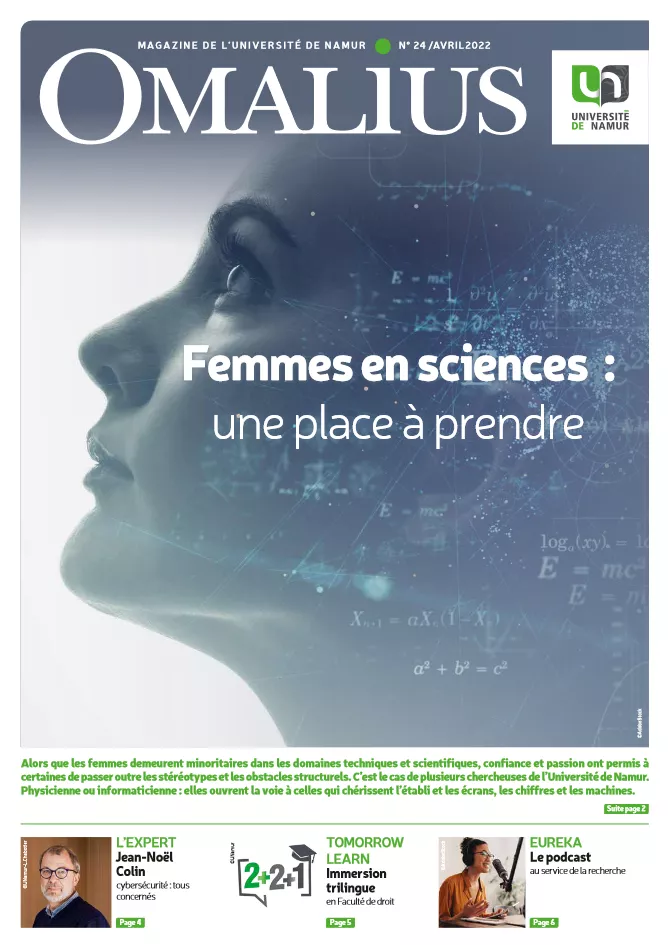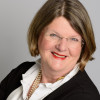
This article was written for the "Issues" section of Omalius magazine #24, April 2022.
Muriel Lepère, a physicist at UNamur, remembers the day when Saint Nicolas was out of place.
Ever since she was a child, the woman who now heads a research laboratory has been interested in cogs, motors and construction games. Although literary and perhaps surprised, her parents let her follow her path.
Meetings with teachers and then colleagues who believed in her did the rest. "I have always made choices to please myself. That's how you increase your passion. And when you are passionate, you can take on bigger challenges," she says. Of course, passion is never easy. "When you make a choice that is not standard, there is always a certain amount of loneliness at some point. You have to accept that people sometimes look at you a bit strangely..."
Anne-Catherine Heuskin, a 36-year-old mother of three, another brilliant physicist at UNamur, says she sometimes feels "a bit behind" her male colleagues. "I remember one Whitsun Monday when a colleague sent an e-mail mentioning the publication of an important study while I was at my washing machine! Another drum, same fight...
In this respect, Muriel Lepère recalls an informal conversation with other women scientists: "We realised that we had in common that we had spouses who shared the household chores and who were also capable of putting their own careers on hold at times. But if you are unlucky enough to be with a conformist, things can be more complicated!"
Machine imagination
"I think it's not so much women physicists that are scary as physics itself," says Anne-Catherine Heuskin. Although physics' reputation for high-flying is not unrelated to the low number of female students the discipline attracts, gender socialization leads women to make more cautious choices. From the sandbox, they are also encouraged to develop more bonding, caring and relational skills.
"When women began to invest massively in these initially very male fields, they did so 'to look after the other', 'to defend' ".
Thus, they continue to be very little present in the fields that escape the notion of 'care', such as physics, mathematics or engineering.
In the Faculty of Computer Science, the percentage of female students is not even above 10%. And among the 14 teachers, there are only two women. "This seems to me to be linked to an imagination of the machine and a very strong masculinisation of the cohorts," comments Nathalie Grandjean. "In the 1980s and 1990s, before computer science became a faculty in its own right, the cohorts were almost equally divided. Then, from the 2000s onwards, when it became a prestigious subject, boys became increasingly interested in it, with a whole imaginary world of the machine linked to self-engineering, to the idea that, in some way, computer science allowed us to be masters of the world... Whereas at the beginning, computer science was seen more as a sub-class of mathematics where you had to be conscientious and precise: a job for a lace-maker, which was therefore more closely assimilated to a girl's job.
Neutralization
Beyond the university setting, how can we fail to see that women have a widespread feeling of incompetence and even insecurity about computers and machines? "The digital divide that affects certain sections of the population is much more marked among women," confirms Stéphanie Wattier. "Anthropology shows that in all human societies, patriarchy has always kept women away from technical tools", reminds Nathalie Grandjean. At a time when teleworking is becoming widespread, when many administrative procedures are now computerized and GAFA seems to rule our lives, this phenomenon is all the more disturbing: by keeping away from computers, women lose autonomy from an individual and collective point of view. "It's very problematic," says Julie Henry, assistant professor at the Faculty of Computer Science at UNamur. "Most of the programs today are developed by white men for white men. We know, for example, that Google's voice system is 70% more likely to recognize a male voice.
The "masculinization" of computer science cohorts can also create many implicit constraints for the 10% of girls who enter them.
"In an auditorium, when a female student doesn't show up, it's immediately obvious," observes Julie Henry. "There is a problem of anonymity. To avoid being noticed even more, female students also seem to have a tendency to "neutralize" themselves.
Muriel Lepère remembers going through a "grey-beige-pants" phase herself when she started out as a physicist, far from the varnished nails and stilettos that she now loves.
"Being very feminine does not prevent her from repairing large experimental physics machines," she laughs. "Even if it still happens that a visitor arrives in my lab and asks me where the boss is...".
If the low presence of women in science and technology is problematic from a social and economic point of view - these fields, which are marked by innovation, are generally more lucrative than the related professions in which women are over-represented - it is also regrettable in terms of fulfilment, well-being and psychological health. How many women, one wonders, have turned away from what really attracted them because of a lack of self-confidence or because of repeated social injunctions?
"I think we all need three essential pillars," says Muriel Lepère. "Health, relationships and personal fulfilment. And I think that women tend to invest too much in relationships at the expense of the other two pillars. But when one pillar collapses, if the other two are not strong, it is much more difficult to cope. A basic physical law, regardless of gender.
Petra Rudolf is a former PhD student at UNamur. She is a German and Italian physicist and has been president of the European Physical Society and the Belgian Physical Society. She is therefore very familiar with the place of women in science. She was at the UNamur on 27 and 28 April 2022 as part of Women in Science event. How does she view gender diversity in science? Interview.
How to deal with gender bias?
We all have biases, we can't help but have them. Our degree of bias depends on our culture, education, etc.
Take the University of Harvard bias test You will probably be surprised by the result!
To counteract this nature, the first step is to realise that we are biased. Anyone who has to make decisions about people and funding should be trained. Even if we are rationally in favour of diversity, our unconscious decision-making process still gets in the way. Secondly, put into practice procedures that prevent us from falling into traps. Whenever a committee has to make decisions, group dynamics come into play. Even if we personally have an opinion, after listening to others, we are inevitably influenced, especially when the opinions come from strong personalities. So setting objective criteria is essential. Secondly, it is beneficial for candidates to have a professional and high-quality interview. It turns a stressful experience into a positive learning experience.
Is being a woman manager a problem?
The situation is improving, but when I started in Groningen (the Netherlands) years ago, I was the first female professor in physics and the third in the country. Today, the academic environment in Groningen is very diverse and international. We try to provide intercultural training for staff. Once you know more about the differences or habits, everything becomes much easier. Being simple, clear and explicit in your communication helps to break down any barriers of cultural differences.
You are a woman scientist in physics. How are you regarded in this world of men?
At least 35% of the academic body is in this situation. Things are changing, but not fast enough (laughs). I am totally enthusiastic about the Belgian system, where the student population is very socially diverse. By the way, is the crèche for the children of UNamur staff and students still open? Yes? Fantastic! I would advise every institution to offer childcare from morning to night.
International Women and Girls Science Day
In order to ensure full and equal access and participation of women and girls in science, and to achieve gender equality and empowerment of women and girls, the United Nations General Assembly proclaimed 11 February as the International Day of Women and Girls in Science in 2015.
At UNamur, a group of young researchers took the initiative to celebrate this day by organising a dedicated annual event, which is now in its third year in 2023. This day of scientific conferences and popularisation is organised around the theme of Women and Science. What are the objectives? To share experiences, consider possible new collaborations, and promote scientific careers to women by presenting inspiring stories.
This article was taken from the Omalius magazine #24, April 2022.







